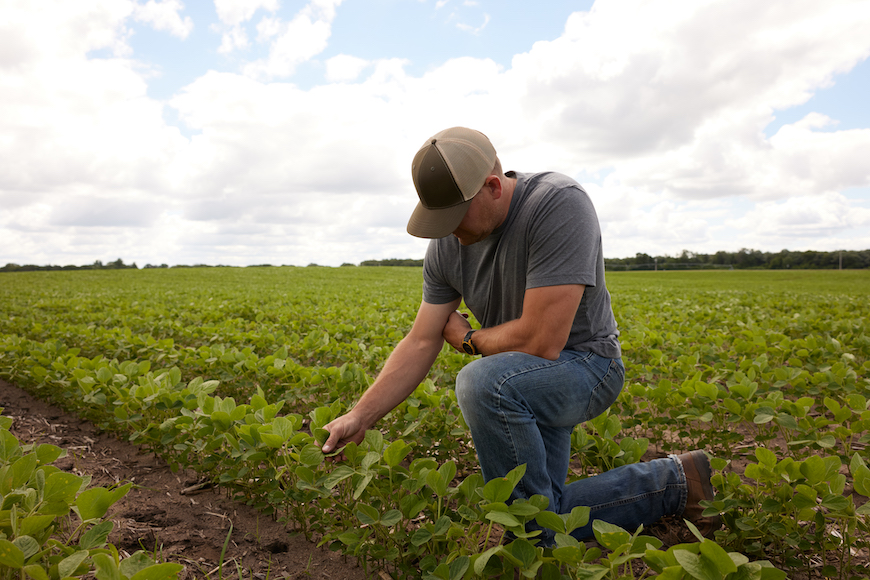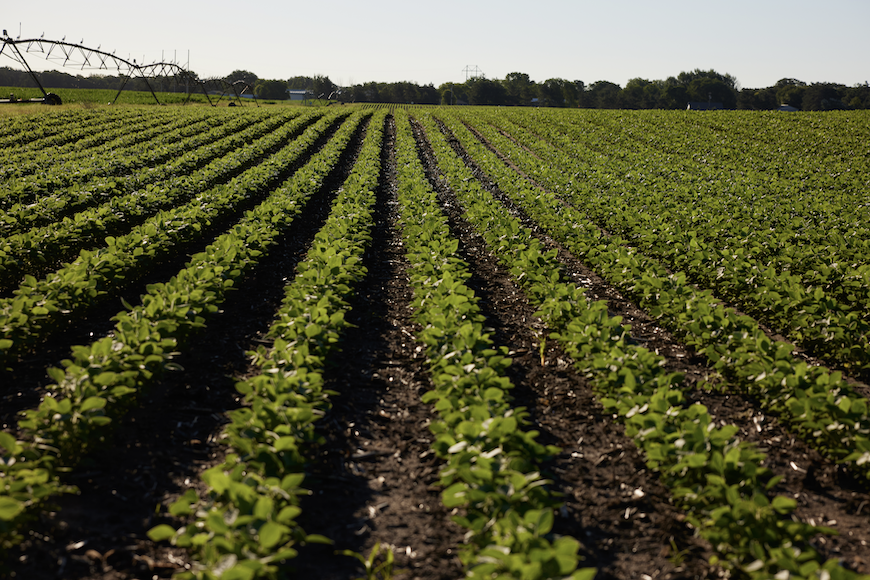How to Leverage Data in Your Biological Product Decisions

Agronomy is like a puzzle: from seed decisions to fertility to pest control, there are so many complex factors that need to connect to make a successful season. What finally makes every piece fit? Data. It’s the critical information that brings everything together, completing the picture.
The biologicals market is a different puzzle in itself. The space is crowded with thousands of products. But, as the industry grows, there’s less data available to back products. Not all data is useful either — you need information that tells you if products have been consistent and could deliver a positive ROI. Just a single strip trial can give misleading results.
Since conducting field tests in the Answer Plot® system as a WinField® United intern, I’ve been driven by the quest for data — to bring valuable insights to growers in my area in southwest Iowa. I test many products each season, including biologicals, to help growers sort through what works locally and what doesn’t. When it comes to making decisions about biologicals on your acres, quality local data helps complete the puzzle.
Often, the most popular or heavily marketed biological products may not produce positive yield. And, when they do, it’s a miniscule bump that might not result in a positive ROI above and beyond the cost of the products. That’s where your local agronomist can help. In my role, I use national, regional and local data to advise growers in their choices — all with the end goal of achieving strong ROI.
Keeping this objective in mind is essential. In tough economic times, cutting costs is common. But it’s important to ensure you’re not making changes that will hurt you more than they’ll save you. Looking at data that also figures ROI can help you determine if biological products are not just the best agronomic fit but also a good economic fit.
I value WinField United research as an agronomist because they’ve been collecting local data for years in their Answer Plot system. The products I bring to the farm gate must hit on at least two performance measures: yield response and consistency of win rate. Answer Plot trials are replicated across a variety of locations, in different growing conditions and throughout many seasons. Even the most popular or high-yielding products might not work regionally or have a consistent return. And Answer Plot data shows us those critical insights.
The BioVerified™ designation vets, tests and evaluates biologicals, narrowing the thousands into a select few that meet strict criteria in four categories:
1. Uniqueness: Products must have a differentiated benefit than others on the market.
2. Agronomics: This includes an identifiable mode of action, strong performance and placement in field.
3. Compatibility: Products should be able to be practically implemented within operations using standard application methods and be flexible with other products.
4. Economics: Products consistently deliver a positive ROI potential for growers.
Each product is put through rigorous testing in Answer Plot field trials, controlled environment studies at the WinField United Innovation Center, through data analysis from third-party vendors or product suppliers or more than one of those. Only those that pass receive the BioVerified™ designation, providing you with a short list of proven products to narrow your search.
I view the BioVerified™ list as a starting point for products to prioritize testing; a reputable source of biologicals to try first. When I suggest a product to a grower, it’s not just about agronomics. At the end of the day, ROI potential and practicality are just as important as what’s on the yield monitor when trying something new. The BioVerified™ designation reflects that by rating biologicals in each of those four metrics (uniqueness, agronomics, compatibility and economics).
One of the biological products from this list that we’ve seen success with in our geography is Ascend® ST3™ plant growth regulator (PGR). We’re testing Ascend ST3 on soybeans this season. So far, the plants treated with Ascend ST3 have tended to show bigger root systems, better early season growth and more consistency in size between emerged plants than those untreated. Optimized for use as a seed treatment with low use rates for simpler drying and handling, Ascend ST3 is also a realistic addition to my growers’ operations.
The products I most like to recommend to growers are ones that fit economically and have delivered strong responses over many seasons in our area. One of those products (first introduced to me by the BioVerified™ list) is YieldON® biostimulant. We’re testing this biological on corn but have seen good results on alfalfa in a system of YieldON, Ascend® SL plant growth regulator and MAX-IN® Ultra ZMB® Plus micronutrient.
Get started by taking a look at the WinField United BioVerified™ designation, and then talk to your local WinField United retailer to find out which products have been working in your geography.
All photos are the property of WinField United or used with permission.
© 2025 WinField United. Important: Before use always read and follow label instructions. Crop performance is dependent on several factors many of which are beyond the control of WinField United, including without limitation, soil type, pest pressures, agronomic practices and weather conditions. Growers are encouraged to consider data from multiple locations, over multiple years and to be mindful of how such agronomic conditions could impact results. Answer Plot, Ascend, BioVerified, MAX-IN, ST3, WinField and ZMB are trademarks of WinField United. All other trademarks are the property of their respective owners.
The biologicals market is a different puzzle in itself. The space is crowded with thousands of products. But, as the industry grows, there’s less data available to back products. Not all data is useful either — you need information that tells you if products have been consistent and could deliver a positive ROI. Just a single strip trial can give misleading results.
Since conducting field tests in the Answer Plot® system as a WinField® United intern, I’ve been driven by the quest for data — to bring valuable insights to growers in my area in southwest Iowa. I test many products each season, including biologicals, to help growers sort through what works locally and what doesn’t. When it comes to making decisions about biologicals on your acres, quality local data helps complete the puzzle.
What Kind of Data to Look For
In my region, I see many growers interested in biologicals and biostimulants to maximize yield potential and boost ROI potential on their operations. But there’s still some confusion about these products. I attribute that to a lack of data, but not just data — replicated data from local trials.Often, the most popular or heavily marketed biological products may not produce positive yield. And, when they do, it’s a miniscule bump that might not result in a positive ROI above and beyond the cost of the products. That’s where your local agronomist can help. In my role, I use national, regional and local data to advise growers in their choices — all with the end goal of achieving strong ROI.
Keeping this objective in mind is essential. In tough economic times, cutting costs is common. But it’s important to ensure you’re not making changes that will hurt you more than they’ll save you. Looking at data that also figures ROI can help you determine if biological products are not just the best agronomic fit but also a good economic fit.
Get Local With It
It’s too important a point not to repeat: Local data is critical when considering if products will work in your geography. National data is crucial to gauge trends and draw broader conclusions, but agronomy happens at home. Of course, widespread data helps tell a story. But ultimately, you have to bring it back to your acres. After all, you’re chasing a return in your environment under your unique fields, with your management system.I value WinField United research as an agronomist because they’ve been collecting local data for years in their Answer Plot system. The products I bring to the farm gate must hit on at least two performance measures: yield response and consistency of win rate. Answer Plot trials are replicated across a variety of locations, in different growing conditions and throughout many seasons. Even the most popular or high-yielding products might not work regionally or have a consistent return. And Answer Plot data shows us those critical insights.
The Value of the WinField United BioVerified™ Designation
As I’m constantly analyzing data and making product recommendations, I appreciate the WinField United BioVerified™ designation because it gives me a place to start. The same can be true for you as a grower. In recent years, the biologicals category has expanded rapidly and will only grow from here. From so many options, it can be a challenge to know where to begin, much less choose the right data-backed product for you.The BioVerified™ designation vets, tests and evaluates biologicals, narrowing the thousands into a select few that meet strict criteria in four categories:
1. Uniqueness: Products must have a differentiated benefit than others on the market.
2. Agronomics: This includes an identifiable mode of action, strong performance and placement in field.
3. Compatibility: Products should be able to be practically implemented within operations using standard application methods and be flexible with other products.
4. Economics: Products consistently deliver a positive ROI potential for growers.
Each product is put through rigorous testing in Answer Plot field trials, controlled environment studies at the WinField United Innovation Center, through data analysis from third-party vendors or product suppliers or more than one of those. Only those that pass receive the BioVerified™ designation, providing you with a short list of proven products to narrow your search.
I view the BioVerified™ list as a starting point for products to prioritize testing; a reputable source of biologicals to try first. When I suggest a product to a grower, it’s not just about agronomics. At the end of the day, ROI potential and practicality are just as important as what’s on the yield monitor when trying something new. The BioVerified™ designation reflects that by rating biologicals in each of those four metrics (uniqueness, agronomics, compatibility and economics).
One of the biological products from this list that we’ve seen success with in our geography is Ascend® ST3™ plant growth regulator (PGR). We’re testing Ascend ST3 on soybeans this season. So far, the plants treated with Ascend ST3 have tended to show bigger root systems, better early season growth and more consistency in size between emerged plants than those untreated. Optimized for use as a seed treatment with low use rates for simpler drying and handling, Ascend ST3 is also a realistic addition to my growers’ operations.
The products I most like to recommend to growers are ones that fit economically and have delivered strong responses over many seasons in our area. One of those products (first introduced to me by the BioVerified™ list) is YieldON® biostimulant. We’re testing this biological on corn but have seen good results on alfalfa in a system of YieldON, Ascend® SL plant growth regulator and MAX-IN® Ultra ZMB® Plus micronutrient.
Ground Your Decisions in Data
With biologicals gaining in popularity, I urge you to take a close look at the data as you consider products for your 2026 plans. Sure, many of these newly released products receive buzz, but what does the data say? Is it sound, sufficient data from multiple trials? Is the product’s response consistent and significant enough to be profitable? Has the product been tested in your area? If the data checks all these boxes, then it may be a good fit for you.Get started by taking a look at the WinField United BioVerified™ designation, and then talk to your local WinField United retailer to find out which products have been working in your geography.
All photos are the property of WinField United or used with permission.
© 2025 WinField United. Important: Before use always read and follow label instructions. Crop performance is dependent on several factors many of which are beyond the control of WinField United, including without limitation, soil type, pest pressures, agronomic practices and weather conditions. Growers are encouraged to consider data from multiple locations, over multiple years and to be mindful of how such agronomic conditions could impact results. Answer Plot, Ascend, BioVerified, MAX-IN, ST3, WinField and ZMB are trademarks of WinField United. All other trademarks are the property of their respective owners.




